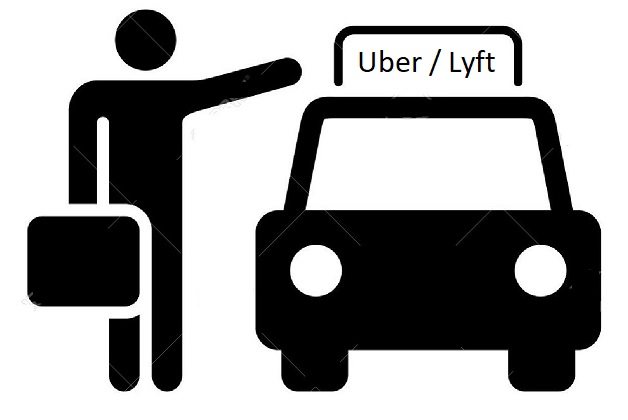Transportation network companies (TNCs), primarily Uber and Lyft, have convinced legislators in the vast majority of states to avoid any regulations and strip drivers of rights. Added together Uber and Lyft lobbyists outnumbered Amazon, Microsoft, and Walmart combined.
TNCs have successfully adopted state interference, an antidemocratic legislative practice favored by the gun industry and popularized by the ultraconservative American Legislative Exchange Council (ALEC), in order to rewrite the law.
In many cases, using these strategies and tactics, TNCs have secured a high level of access in multiple state and city legislative processes, enabling it to draft its own bills.
City / State Interference:
National Employment Law Project, January 18, 2018
Executive Summary
Over the past four years, transportation network companies (TNCs), primarily Uber and Lyft, have convinced legislators in the vast majority of states to overrule and preempt local regulations and strip drivers of rights. The speed and sweeping effectiveness of the industry’s use of this strategy, known as state interference (or preemption), is unprecedented.
In this report, we set out to describe how two upstart companies have been able to convince state governments to swiftly and aggressively deregulate their industry and how their success has impacted stakeholders. The report seeks to arm legislators and the public with knowledge and tools to understand and address this phenomenon, protect communities most impacted by this industry, and uphold local democracy.
In-depth case study analyses in four states, Florida, Pennsylvania, Texas, and Washington, reveal that the TNCs’ strategy has been to create political crises in localities—where for-hire transportation has traditionally been regulated—and then move state legislators to solve the manufactured crisis through state interference. The case studies detail the “barge in, buy, bully, and bamboozle” tactics the companies use to advance this strategy and the impacts on for-hire drivers, who are predominantly immigrants and people of color, and the communities in which they live.
Summary of Findings
TNCs have successfully adopted state interference, an antidemocratic legislative practice favored by the gun and tobacco industries and popularized by the ultraconservative American Legislative Exchange Council (ALEC), in order to rewrite the law.
TNCs have secured preemptive state law in over four out of five states. Lawmakers in 41 states have passed laws that have taken away some or all of the ability of localities to set their own standards for the TNC industry.
Preemption has tremendous impact on local transportation and largely deregulates the industry as a whole.
State interference is a political strategy pioneered by the tobacco industry and the National Rifle Association and employed aggressively by the ultra-conservative American Legislative Exchange Council (ALEC) and other corporate interest groups, like the National Restaurant Association and, more recently, TNCs Uber and Lyft. As detailed further below, there are a number of connections linking the TNC industry and ALEC.
State interference on behalf of TNCs harms people of color. As in other cases of state interference, state interventions into local for-hire regulation involve predominantly white legislatures blocking local programs and policies that benefit people of color, in this case for-hire drivers who are predominantly people of color and immigrants.
State interference is a means to rewrite employment law. While state action on TNCs is often characterized as a solution to a “patchwork” of local laws, in fact TNCs may pursue state interference in part because state lawmakers can address one of their core policy goals: to rewrite state law on employee status. By rewriting the law, they exempt themselves from a myriad of employment protections – state minimum wage, unemployment insurance, workers’ compensation, discrimination laws, fair chance hiring and paid sick leave where they exist, and efforts to pass a collective bargaining process at the city level.
To move states to intervene, in the case studies reviewed for this report, TNCs (and Uber in particular) created a political crisis at the local level, and pushed the state to solve that crisis through four primary tactics: barge in, buy, bully, and bamboozle.
BARGE INTO a market, sometimes illegally, and spend large amounts of money to quickly develop a customer and driver base. When first entering markets, companies offered incentives to drivers and free rides to passengers, and have even paid fines drivers receive for operating illegally. To avoid law enforcement, Uber went so far as to develop a program that identified individual public employees and officials, and then blocked their ability to use the app to hail rides.
BUY access by deploying an overwhelming number of well-connected lobbyists to make contact with elected officials and their staff. In Portland, 16 Uber and Lyft lobbyists and company representatives appear in city officials’ contact logs in 2015, accounting for 30 percent of all city lobbyist activity that year. Across the country, in 2016 Uber had 370 active lobbyists in 44 states, dwarfing some of the largest businesses and technology companies.
BULLY elected leaders by individually targeting them and issuing ultimatums. In Texas, one or both of the two major TNCs suspended service in numerous cities, including Austin, Corpus Christi, Galveston, Houston, and Midland, when city legislative bodies (and voters in the case of Austin) imposed reasonable regulations on them.
BAMBOOZLE customers to take political action, frequently by misrepresenting the facts, and often via the app itself. Messages to customers have claimed that city councils, county boards, or state legislatures are threatening to “force” the TNCs to leave, when in fact elected governments are seeking to enforce existing laws or even create basic safety requirements that other businesses follow. Then the TNCs continue with the first three tactics described above.
In many cases, using these strategies and tactics, Uber has secured a high level of access in multiple state and city legislative processes, enabling it to draft its own bills, heavily influence the vetting, and even effectively staff elected officials on the issue. In Oregon and Ohio, Uber wrote or co-wrote the original drafts of legislation, and legislators in multiple other states characterize legislation as written by or in the primary interest of the industry.
TNCs have secured state laws that deregulate portions of the for-hire industry and rewrite employment law, harming drivers and communities in the process.
When TNCs succeed in pushing legislation that exempts their drivers from state labor laws, such as unemployment insurance, workers compensation, and minimum wage, drivers no longer have access to redress or benefits afforded to other workers in the state.
Disability rights advocates contend that TNCs, by failing to provide wheelchair accessible vehicles, are in violation of laws protecting people with disabilities. Weak state laws generally only require the TNCs to have a non-enforceable“policy” against discrimination.
Deregulating TNCs may be hurting the climate by undermining public transit and adding more vehicle miles traveled (VMT) to city streets. A study of San Francisco TNC riders found that one-third of those surveyed would have used public transit for their most recent trip, were TNCs not available.1
Overriding local communities erodes democratic governance and the ability of local government to meet the unique transportation needs of residents. When locally-elected policymakers are prevented from creating policies that protect and respond to the needs of residents, or the policies they do pass are overridden by state legislatures beset by blitzkrieg-style lobbying, then local participatory democracy is at stake.
Summary of Recommendations
State and local legislators and advocates can bring fairness to the sector and oppose undue influence by corporations on our government. The following include some of our recommendations:
State legislators should reject efforts to preempt local authority with respect to TNCs, and instead delegate regulation of TNCs to local transportation authorities, just as many states have done for taxi regulation. Alternatively, they should work closely with cities to develop policies that establish a statewide floor, allowing cities flexibility to customize TNC regulations. They should reverse laws that strip drivers of their rights as employees.
Local legislators should require TNCs to comply with local labor standards and be alert to any attempts to define drivers’ employment relationship as independent contractors in city legislation and rulemaking; require TNCs to share, with appropriate privacy safeguards, the data that communities need
to ensure that TNCs are strengthening rather than undermining mobility and transportation; and learn about and support innovative ways to ensure for-hire drivers can form alternative business models, like cooperatives and nonprofit organizations.
Advocates and local leaders should stress the uniqueness of local communities and that one size does not fit all; call out (and use litigation to attack) racial injustice when it occurs as part of preemption; and support elected officials who lead on local policymaking rights and equity in the industry.
Citizens Taking Action for transit dependent riders
website
facebook

